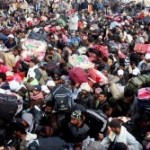The current era of the Mayan calendar ends in December 2012, which has led to the belief that the world could end a little over 12 months from now. But in the Middle East at least, the Mayans were a year off: The world as we know it ended in 2011.
The core event that changed the region is the Arab Spring. For years, the violent and unpredictable Middle East had consistency in its despotic leadership. Allegiances were largely settled and sort of uneasy balance had been achieved. And now the hopes for the Arab Spring to bring pro-West democracy have been soured by the rise of Islamist forces in elections.
Israeli Defense Minister Ehud Barak noted the concerns in his comments on Monday to the Knesset’s Foreign Affairs and Defense Committee. A summary of his comments released by his office said he feels it is “still too early to determine whether the ‘Arab Spring’ will turn into an ‘Islamic Winter,’” although history has taught that the Israelis “need to stay alert.” Barak noted that the “central characteristics” of the Arab Spring are “uncertainty and instability.”
That true on a specific and individual level, as well as in a general sense. Libya’s Muammar Gaddafi was evil and internationally dangerous, but he had become relatively pragmatic and truly allied with few. Hosni Mubarak of Egypt was a long-time ally of the West, accepted the peace with Israel and even provided leadership in the Palestinian-Israeli conflict—even if he was clearly less than perfect in all those areas.
But now? Libya is led by a group of rebels whose full control of the country, and more importantly its weapons, is somewhat uncertain long-term. And despite the support of NATO in helping the rebels, will the same leadership and appreciation towards the West stay intact?
Egypt is even more uncertain. Decades of peace with Israel is at least questionable. And even if it continues, will the new Egyptian government force changes to the deal with the Israelis?
Another question about post-Mubarak Egypt is a concern that stretches across the region: Who will be the allies for the new regime? The highly influential Muslim Brotherhood is affiliated with Hamas, but will those ties simply warm the relations between the groups or lead to serious concerns for Israel and the West? And were the earlier gestures between Cairo and Iran a sign of more to come—or proof nothing more is coming?
On the flipside, the ongoing protests and insurgency in Syria has raised the possibility that Iran’s most crucial regional ally could shift sides. The opposition in Syria is angered by Tehran’s ongoing support of the Bashar al-Assad regime. Because of that, the Syrian rebels appear to be likely to abandon Iran and its proxy, Hezbollah.
The war on terror is also in doubt. With regards to Egypt, the Sinai is a mess. For years the Egyptian government managed to maintain a small semblance of control and counterterrorism in the region between Egypt proper and Israel, but now smugglers and terrorists seem to have the upper hand.
Whether that’s intentional on the part of the Egyptian leadership, or a result of the turmoil in Cairo, is irrelevant. The gas pipelines to Israel and Jordan, and the Israeli south around Gaza, are all more vulnerable because of it.
Yemen has its own concerns. President Ali Abdullah Saleh may be a brutal dictator, but he was helping the Americans in the war against Al Qaeda. His expected eventual departure will call that counterterror effort into doubt.
But the questions go far beyond the individual nations. The potential rise of Islamism could impact nations whose leadership survives the regional protests, as concessions could be made by regimes to try and stave off their own uprisings.
And most importantly, the regional situation can no longer be taken for granted. Dictators are on notice and even the most stable governments today could be history tomorrow.
According to the Israeli Defense Minister’s office, Barak summarized this shift well. His office’s paraphrase of his comments noted “the old order in the region has been seriously undermined and a new order must take its place.”
Considering that the old order has dominated a critical region of the world for decades with more consistency and stability of leadership than Europe, Russia, Asia or the United States, the very fact that that order is crumbling is stunning. The world as we knew it in the Middle East has indeed come to an end.
Here’s hoping the changes in the oil-rich, terrorist-influenced region lead more towards utopia—not apocalypse.
(By Joshua Spurlock, www.themideastupdate.com, January 3, 2012)

